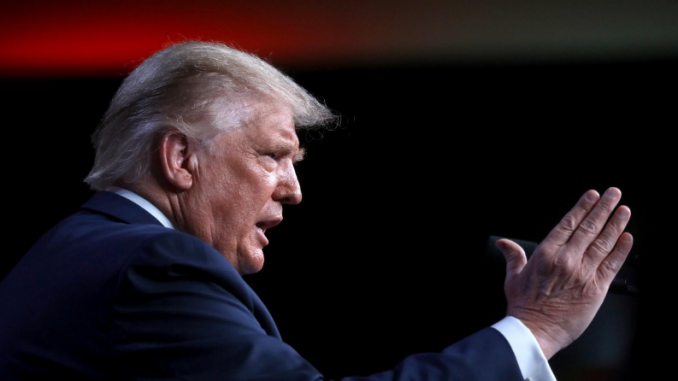
Published April 10, 2024
Pro-lifers are used to Republican politicians stabbing us in the back. Donald Trump has stabbed us in the front.
It is not an improvement.
Less than two years after the generational victory of the Dobbs decision overturning Roe vs. Wade, the pro-life movement is facing generational catastrophe. The crisis is not that we have lost a series of ballot initiates to the pro-abortion side (bad as those losses are), but that the Republican presidential nominee is openly abandoning and sabotaging the pro-life cause. Rather than cashing out after their unexpected wins at the Trump political casino, pro-life Republicans largely doubled-down and backed him for 2024. Now, pro-lifers might lose the Republican Party.
Trump sees being pro-life as a political liability. He therefore wants to assuage the concerns of pro-abortion swing voters—while also keeping pro-lifers in his camp by pointing to the pro-abortion extremism of Joe Biden and the Democrats. There may be some political cunning in this, as illustrated by my EPPC colleague Henry Olsen’s sobering analysis of what it will take for pro-lifers to win in Florida’s upcoming referendum on abortion. Olsen, a shrewd political observer, describes a distressingly pro-abortion public.
But Trump’s assessment of pro-life policy as a political liability may also be a self-fulfilling prophecy. Leadership matters. Trump and his apologists in conservative media presume that the public is static and incapable of persuasion. But we know that this isn’t true, and that even many voters who are squishy on abortion are willing to support pro-life politicians. Were such politicians leading the GOP today and making the pro-life case, matters might look very different. But it’s Trump’s party now, and he not only has little personal pro-life conviction, he has also found the pro-life cause a convenient scapegoat after the failures of his MAGA candidates turned an expected 2022 red wave into a pink ripple.
The truth is that Trump is a far greater drag on Republican fortunes than opposition to abortion. And, despite Trump’s cynical blame-shifting, it remains the case that presidents and presidential candidates can significantly reshape public opinion. Indeed, Trump’s many devoted fans are particularly inclined to reshape their opinions to match his. These voters are more tribal than principled, but instead of guiding them toward truth, Trump is encouraging their worst impulses and pushing them to be more hostile to protecting human life in the womb.
Many Republican politicians are following Trump’s lead and undercutting those who still champion the unborn. This is not new, as demonstrated by Trump denouncing Florida’s heartbeat bill last year, but such betrayals are increasing as we head into the 2024 elections. MAGA is just as eager to avoid doing anything substantive on abortion as the old GOP establishment was. As Ross Douthat put it:
Trump is a fine post-Roe leader for a GOP that just wants to reassure swing voters that the party doesn’t care enough about the issue to legislate nationally. OTOH [on the other hand] he’s a terrible leader for a GOP that aspires to ever persuade anyone, win any referenda, or legislate responsibly.
The pro-life movement will have to make hard choices as it prudentially navigates the years ahead, but that is not what Trump and his imitators (e.g. failed Arizona gubernatorial candidate and current Senate candidate Kari Lake) are doing. They aren’t trying to find the optimal tactics in the struggle against abortion; they just want to stop having to address abortion as a political issue. Which is to say that they want to surrender.
They want to give up because they do not actually believe in the pro-life cause, and therefore have no interest in using their influence to persuade people toward it. In contrast, though pro-lifers know that we will sometimes have to make painful prudential compromises, we will not give up on persuasion, because we believe the pro-life cause to be right and righteous, rooted in love and human solidarity. It is beautiful and noble, especially when set in contrast to the bloodshed of abortion, which violently destroys the primeval human relationships of mother, father, and child.
The case for abortion presumes that men and women’s interests are opposed and that they cannot rely on each other, and that children are burdens. Abortion seeks freedom from obligation and commitment, from the mutual interdependence that is intrinsic to human nature and flourishing. Abortion presumes that what matters is getting yours—sexually, financially, socially—while the getting is good.
This is why Donald Trump is utterly unfit to persuade anyone to the pro-life cause. Trump may be an avatar for many things, but unselfish love and compassion for the weak and vulnerable is not among them. As President, Trump can appoint judges and have his officials enact policies, but whether in office or on the campaign trail he is incapable of sincerely articulating, let alone exemplifying, the restraint, self-sacrifice, kindness, and love that are the basis of the pro-life cause.
This leaves pro-lifers in a difficult position, as both another Biden term and another Trump term might devastate pro-life efforts—Biden by advancing radically pro-abortion policies and tipping the balance of the federal judiciary back toward pro-abortion jurisprudence, Trump by turning the Republican Party decisively against any meaningful steps to protect human life in the womb.
There are hard choices to make, and hard lessons to learn, especially for those who had placed far too much trust in an alliance with a wicked old man.
But amidst the hardship and political turbulence, there is still hope. Whether popular or not, the fight to protect innocent human life is a righteous one, and our ultimate reliance is in a God who can change hearts and minds and raise up leaders even in the darkest of days.
Nathanael Blake, Ph.D. is a Postdoctoral Fellow at the Ethics and Public Policy Center. His primary research interests are American political theory, Christian political thought, and the intersection of natural law and philosophical hermeneutics. His published scholarship has included work on Jean-Jacques Rousseau, Hans-Georg Gadamer, Alasdair MacIntyre, Russell Kirk and J.R.R. Tolkien. He is currently working on a study of Kierkegaard and labor. As a cultural observer and commentator, he is also fascinated at how our secularizing culture develops substitutes for the loss of religious symbols, meaning and order.











